Chapters
What is Keyword Research?
The cornerstone of what takes content marketing from good to great is keyword research. Simply put, this is the process you use to come up with a list of keywords you want to rank for online.
These relevant keywords and phrases help you define your content map. They also help with your editorial calendar while addressing user intent in a way that speaks to both the end reader and the search engines.
You can’t succeed with SEO if you don’t have a defined process for keyword research. In this article, you’ll learn the why and how of great keyword research. You’ll also learn how to establish a process you can turn to again and again to help your website rank for the right terms.
Without keyword research, you can’t begin to create a plan for SEO or implement that plan to drive valuable traffic to your website. Keyword research is all based on the foundation of search intent. That is, what the reader was actually looking for when they entered this information into a search engine.


Why Does Keyword Research Matter?
Keyword research both sets the tone and gives you the roadmap to crafting great material for content marketing.
Keyword research and knowing what tools to use significantly helps you rank for the right phrases in search engines. However, keyword research also gives you critical data about your readers. This includes who they are, what they need help with, and the kinds of information you can provide that directly relates to their concerns.
If you use a clear keyword research process as the first step to creating great content, you can become a thought leader. Furthermore, you can make readers feel as though you wrote content just for them each time they land on one of your pages.


Important Keyword Research Terms
In the process of doing keyword research, you might come across several unfamiliar terms. These are explained below.
Keyword Difficulty in SEO
Knowing how difficult your chosen keywords will be to rank for is critical when deciding on target keywords.
Keywords with strong competition are not a good place to put your focus, especially at first. Look for keywords for which you have a chance to rank instead. This means good search volume and a low level of competition.
CPC in SEO
Building your organic search strategy with keywords might lead you to ignore paid options, but CPC is still a valuable metric. Cost Per Click (CPC) describes the cost a search engine charges to an advertiser when a visitor clicks on their sponsored link.
The amounts charged vary depending on which search engine they are using and the popularity of the keywords.
High traffic keywords will cost more to advertise than more obscure ones. In addition, more popular search engines tend to charge more than less popular search engines.
This will help back up your selection of keywords for those with low levels of competition since the CPC should be lower than other keywords.
Search Volume
When researching keywords, pay close attention to the search volume of your target keywords. Search volume is the number of times that a specific keyword is searched for in a given month.


You can see here that the cost per click of the chosen keyword “paleo diet” is $.36, which is likely due to the volume of average monthly searches.


Making a List of Keywords
Keyword research doesn’t have to be difficult. But far too many people approach content marketing by picking keywords the wrong way. They choose keywords a writer, not a reader, would use. This means leaving readers – and money – on the table, because at the end of the day, keyword research should be all about user intent.
The truth is that your keyword research tool should only be used after you make a keyword list.
The truth is that plugging your basic keyword into Google’s Keyword Planner only gives you basic results.
That’s because KP is only going to show you keywords directly related to what you typed in. While this is a decent starting point, it doesn’t clarify all the related keywords you should target.
That’s critical because those related terms and topics definitely belong in your keyword list. They are where the traffic – and money – are at.
Making a list of keywords goes one step beyond by telling you how your target audience thinks.
This information will help you craft a content and keyword strategy through the eyes of the end reader. On your own, you’re unlikely to be able to guess how to do this, but there are tools that help you create a targeted keyword list. We’ll explore those a bit later in this article.
From Narrow to Broader: The Right Keyword Research Strategy
One mistake made by most people new to SEO and picking keyword lists is focusing only on the obvious.
These obvious keywords are very competitive and only allow for limited room to write and create high-quality content. With so many people using only those keywords to create content, it can be very difficult to break in. Many of the related keywords are more important anyway.
Take the example of a person searching for information on the paleo diet. Those two words, “paleo diet”, are the most obvious to add to your keyword list.
But, if you stop there, you’re leaving traffic on the table. In order to succeed with keyword research, you have to start with a narrow topic or set of search terms.
But then you have to go broader, thinking more specifically about what other kinds of things that same reader would want to know.
This is where you create a keyword list and begin to frame how you’ll become a web “thought leader”. You’ll start with those main keywords eventually while first getting results with the related keywords.
Someone researching the paleo diet might also be looking for:
- Grain-free recipes
- Autoimmune protocols
- Breaking a sugar addiction
- The best time of day for exercise
- What are good vs. bad carbs
Initially, you might have run off to the races to write a giant article on the paleo diet targeting only those two keywords.
But readers don’t think like that, and search engines don’t either. You can eventually target the “paleo diet” keyword by writing other content. This means thoughtful, in-depth content that the same reader would care about.
That same reader probably has a general interest in health or wellness. Or, they’re ready to break free of bad habits and live a healthier lifestyle. They might be wondering how much prep and cooking time is required to make paleo food.
Or, they might think of how they can transition from a processed food diet to one that’s more plant-based.
By meeting the reader where he or she is at and providing content to their general interests in this field, you can build up to ranking for “paleo diet”. This means first ranking with these other topics that are more likely to build a following and earn the reader’s trust.
Starting with your focus keyword also gives you a good frame of reference for other topics.
On your own, you might not have ever thought of mentioning the Atkins diet or the Pritikin diet, right?
Now that you know that your reader might be searching to find the right diet plan for themselves, you can write articles about the Atkins diet pros and cons.
Or, you can even compare with other types of diets. You address the reader’s underlying psychological standpoint and interest first. But you also building up to your paleo diet-specific page over time.
Free yourself from the simplicity of typing “paleo diet” into Google’s Keyword Planner. Start by brainstorming other related topics and keywords that could also interest your buyer persona. Then you can use each of these to do keyword research to determine specific terms and concepts to mention.
Inside Keyword Planner you can also see “related terms to try” as a helpful place for creating even more keyword lists and ideas.
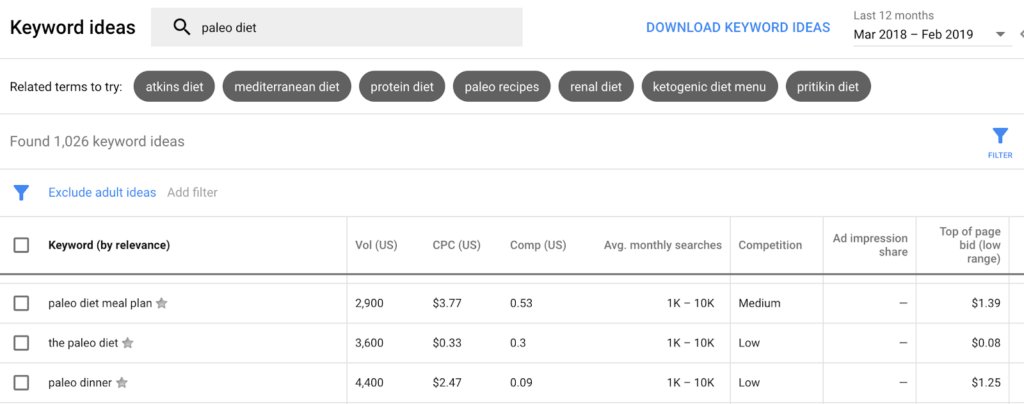

Within each of these articles, you might also reference the paleo diet, but it won’t be the main point of the articles you create first. Instead, these sub-articles will build up to the bigger topic, so that it operates as a “hub” of information.

How to Do Keyword Research
Your final step involves taking your list and editing it. Use a keyword planning tool to check out your list of keywords. Here you can find search volume and traffic numbers so that you can pick and choose which keywords will serve you best. Aim for keywords that have a high search volume with low difficulty.
Within each of these articles, you might also reference the paleo diet, but it won’t be the main point of the articles you create first. Instead, these sub-articles will build up to the bigger topic, so that it operates as a “hub” of information. Your final step involves taking your list and editing it. Use a keyword planning tool to check out your list of keywords. Here you can find search volume and traffic numbers so that you can pick and choose which keywords will serve you best. Aim for keywords that have a high search volume with low difficulty.


Keyword Research Tools
There are many great keyword research tools to help you on your SEO journey. Here’s an overview of each tool and how they may help you out.
UBER SUGGEST
This handy tool takes a primary keyword target and automatically provides you with a multitude of similar keywords that may complement your SEO. Use Ubersuggest to help you brainstorm keyword and topic ideas to ensure that your content is relevant to your audience.


Here’s what’s interesting about Ubersuggest — while we already know that the primary search term we started with is competitive, we now have a breakdown of the chance to rank in the top 20 on this particular word. Ubersuggest makes for a great backup to Google Keyword Planner to make sure you’ve considered all aspects of your refined keyword list. Now let’s try a good long tail keyword.


This shows me that even though the CPC is high, the search volume is lower and that SEO difficulty is going to be easier to target.
GOOGLE KEYWORD PLANNER
Select the right terms for your content marketing strategy through the use of Google Keyword Planner. This tool helps you with finding new keyword opportunities, analyze current keywords, and making a solid plan for your SEO. Earlier in this article you saw some examples of how to use KP for generating keyword ideas.
KWFINDER
KWFinder offers accurate keyword difficulty scores and provides a list of low difficulty keyword options that your competitors might be missing. Plus, this keyword planner tool will give you exact search volumes. This will help to give you a great understanding of the keywords you want to rank for. One of the interesting things about KWFinder is that you can see some other information. This includes the pages that rank well for this search term already and how many hits they get.
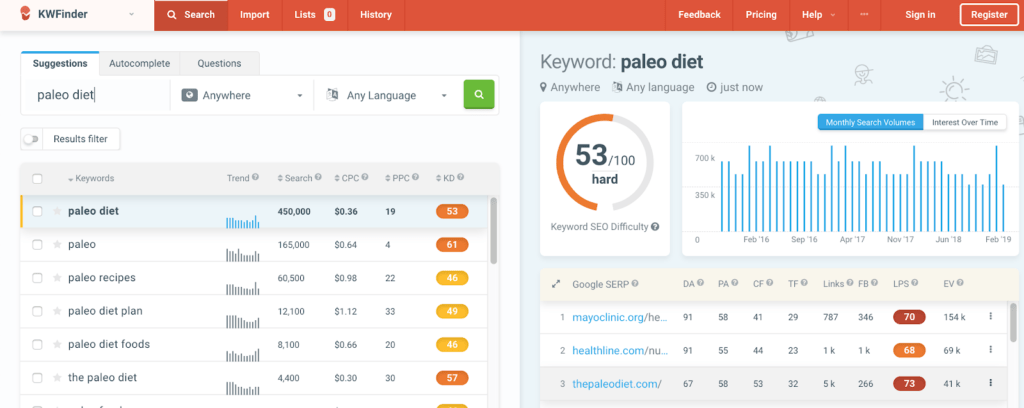

MOZ KEYWORD EXPLORER
This keyword tool provides a highly automated process that gives you useful keyword data. With Moz’s Keyword Explorer, you can sort through thousands of keyword suggestions. You can even explore a detailed analysis of keyword metrics. These metrics include search volume, difficulty, opportunity, and potential.
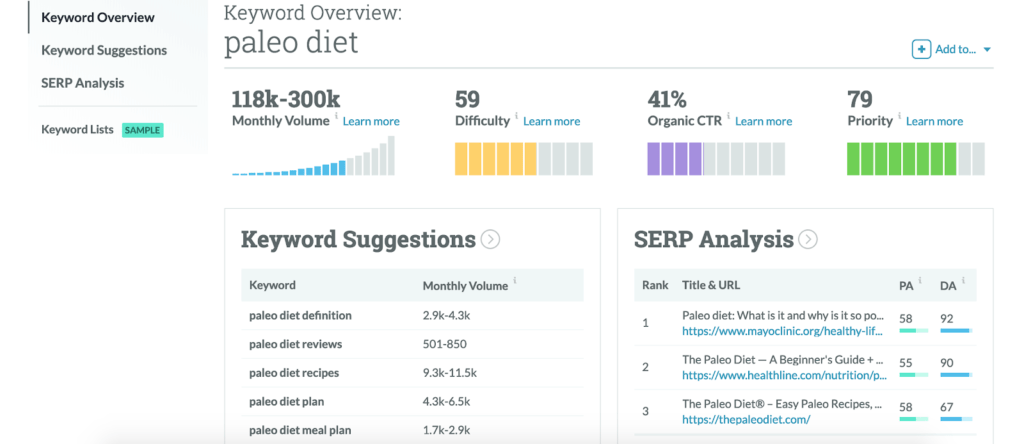

AHREFS KEYWORD EXPLORER
Ahrefs Keyword Explorer is a thorough keyword research tool with many great uses. With this power tool, you can:
- Research keywords
- Analyze the competition
- Track keywords over time
- Audit websites
- Audit backlinks
- Find link prospects from your competitors’ sites
Ahrefs is a great tool, but that’s because you have to pay to play. After your trial expires, the lowest-tier plan with only five campaigns is $99.
GOOGLE SEARCH CONSOLE
This free service offered by Google helps you to monitor and maintain your site’s rankings in Google. Google Search Console gives you an insider look at how Google views your webpage. Everyone with a website should take advantage of this handy tool from Google even though it doesn’t go as far as other keyword research tools.
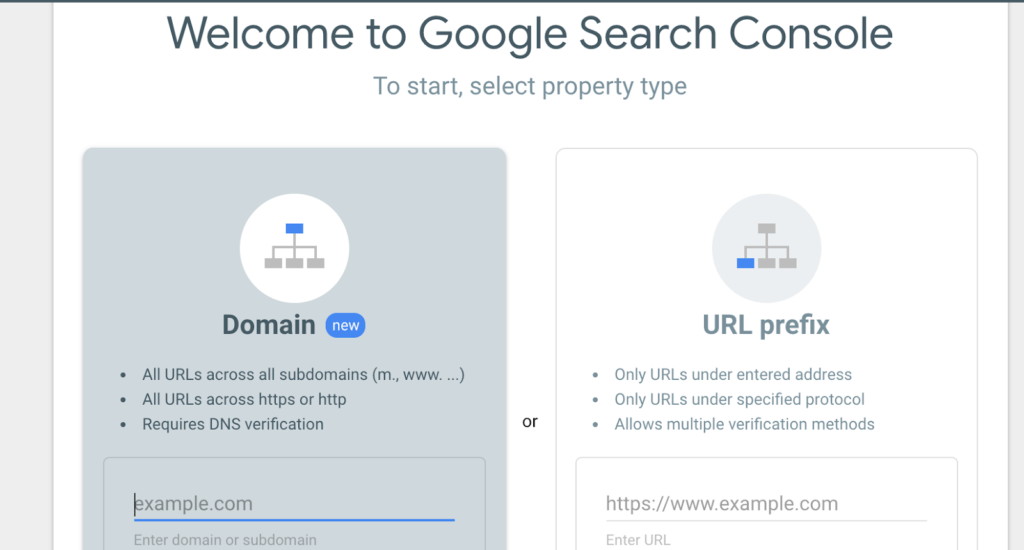

SEMRUSH
Take the guesswork out of analyzing your competition and prospective market with SEMRush. SEMRush gives you a thorough platform for researching keyword and domain analytics. This will make your content market process a lot simpler. The major advantages of SEMrush are only unlocked when you have a paid account with this keyword research tool.
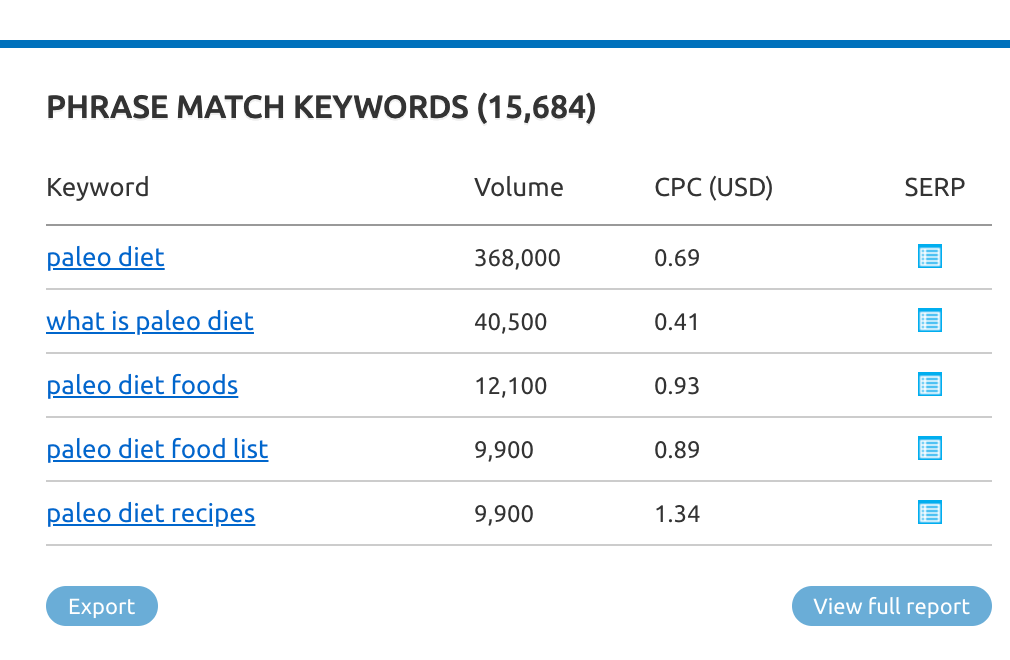

Summary
Keyword research serves as the blueprint on which we can build a well-optimized website. With a great keyword research process in place, you can drive customers to your website and encourage new business. Put simply, keyword research is the first stage in ensuring your content gets seen by the right readers. It also sends a signal to the search engines about which topics your site covers. Keyword research drives all of the content you create and helps you to establish your site in that industry. As a refresher, keyword research consists of three categories of keywords: head, body and tail keywords. To know which keywords to use, you need to analyze a few things: difficulty, CPC and search volume. To make this process easier, there are a number of great tools available. Your best results will be obtained by using paid tools, but you can certainly get a jump on your project by using free tools. Throughout this article, we have discussed what keyword research entails. We also covered why it is important, and how to go about starting your keyword research planning. Remember that it all boils down to user intent. From one specific article to many that provide thoughtful, well-written ideas, you can begin to grow your site and rank in search engines. With your newfound knowledge on keyword research in hand, there’s no time like the present to dive into your keyword research project and generate your first keyword list.








Thanks for the awesome guide Alexander. Really useful!